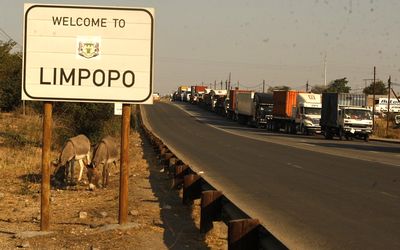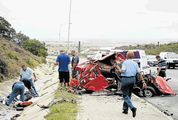THE South African National Roads Agency Limited (Sanral) is due to start levying road charges on south-bound traffic at Beitbridge, the country’s busiest land border post.
However, motorists should not expect a change in fees, according to the roads agency.
More than 2,000 cars pass through the Beitbridge border post a day in both directions.
Beitbridge was a concession toll facility for 20 years until 2014 and was operated by New Limpopo Bridge, the company that built the bridge in 1994. The project was funded by Nedbank, Sanlam, Old Mutual and New Limpopo Bridge Projects, an investment firm controlled by Israeli citizens Mordechai Tager and Zion Elani.
When the Beitbridge toll collection concession expired in June 2014, the project was handed over to the Zimbabwean authorities, with motorists coming into and out of that country paying fees to the Zimbabwe National Road Administration (Zinara).
Zimbabwe was expected to pocket $1.6m a month from these toll fees.
Sanral spokesman Vusi Mona explained that a bilateral agreement entered into by the two countries in 1994 stated that each state would be responsible for collecting the respective road charges.
"Sanral is now carrying out its contractual obligation. There will no longer be tolls but road charges, as happens at many borders between two countries," he said.
Sanral was conducting studies on the number of vehicles crossing the border and could not speculate on how much it would collect in revenue, Mr Mona said.
The South African Revenue Service (SARS) was still considering whether it would help in collecting the road charges as it already collected other taxes and duties at the border and had the infrastructure to assist.
This would be a determining factor in whether Sanral would have to build new infrastructure at Beitbridge to collect the south-bound road charges.
Transport economist Andrew Marsay said there was little difference between a toll and a road charge. Tolls were usually contractually related to funding road maintenance or managing congestion on a defined section of a road network. Road charges were generally linked to the reality that usage led to costs. Revenue from road charges did not go into a fund that is applied for road upkeep. Mr Marsay said the Southern African Development Community (Sadc) had a policy that stipulated that countries "may, and indeed should" charge transit traffic for the use of each other’s infrastructure. Zimbabwe and Botswana are examples of Sadc countries that charge for the use of their roads.
"SA is reciprocating — not to ‘get at’ Zimbabwe — but to normalise international transport charging arrangements," said Mr Marsay.
"SARS will, in due course, meet with Sanral to discuss the way forward," spokesman Sandile Memela said. Transport analyst Paul Browning said Beitbridge was "the single most used" point of entry for road traffic.
There were many heavy trucks that had non-SA number plates that travelled on the N1 in convoys of eight to 10 vehicles, in some cases carrying sheet metal. This added to the wear and tear of the national roads they travelled on, Mr Browning said.
"They do pay the heavy-vehicle tolls on the N1 from Polokwane, but not from Beitbridge to Polokwane, and not on the Gauteng e-tolled freeways.
This is a specific reason for imposing a road charge on entry," said Mr Browning.

The Beitbridge border post in Limpopo. Picture: SOWETAN
THE South African National Roads Agency Limited (Sanral) is due to start levying road charges on south-bound traffic at Beitbridge, the country’s busiest land border post.
However, motorists should not expect a change in fees, according to the roads agency.
More than 2,000 cars pass through the Beitbridge border post a day in both directions.
Beitbridge was a concession toll facility for 20 years until 2014 and was operated by New Limpopo Bridge, the company that built the bridge in 1994. The project was funded by Nedbank, Sanlam, Old Mutual and New Limpopo Bridge Projects, an investment firm controlled by Israeli citizens Mordechai Tager and Zion Elani.
When the Beitbridge toll collection concession expired in June 2014, the project was handed over to the Zimbabwean authorities, with motorists coming into and out of that country paying fees to the Zimbabwe National Road Administration (Zinara).
Zimbabwe was expected to pocket $1.6m a month from these toll fees.
Sanral spokesman Vusi Mona explained that a bilateral agreement entered into by the two countries in 1994 stated that each state would be responsible for collecting the respective road charges.
"Sanral is now carrying out its contractual obligation. There will no longer be tolls but road charges, as happens at many borders between two countries," he said.
Sanral was conducting studies on the number of vehicles crossing the border and could not speculate on how much it would collect in revenue, Mr Mona said.
The South African Revenue Service (SARS) was still considering whether it would help in collecting the road charges as it already collected other taxes and duties at the border and had the infrastructure to assist.
This would be a determining factor in whether Sanral would have to build new infrastructure at Beitbridge to collect the south-bound road charges.
Transport economist Andrew Marsay said there was little difference between a toll and a road charge. Tolls were usually contractually related to funding road maintenance or managing congestion on a defined section of a road network. Road charges were generally linked to the reality that usage led to costs. Revenue from road charges did not go into a fund that is applied for road upkeep. Mr Marsay said the Southern African Development Community (Sadc) had a policy that stipulated that countries "may, and indeed should" charge transit traffic for the use of each other’s infrastructure. Zimbabwe and Botswana are examples of Sadc countries that charge for the use of their roads.
"SA is reciprocating — not to ‘get at’ Zimbabwe — but to normalise international transport charging arrangements," said Mr Marsay.
"SARS will, in due course, meet with Sanral to discuss the way forward," spokesman Sandile Memela said. Transport analyst Paul Browning said Beitbridge was "the single most used" point of entry for road traffic.
There were many heavy trucks that had non-SA number plates that travelled on the N1 in convoys of eight to 10 vehicles, in some cases carrying sheet metal. This added to the wear and tear of the national roads they travelled on, Mr Browning said.
"They do pay the heavy-vehicle tolls on the N1 from Polokwane, but not from Beitbridge to Polokwane, and not on the Gauteng e-tolled freeways.
This is a specific reason for imposing a road charge on entry," said Mr Browning.






















Change: 1.37%
Change: 1.32%
Change: 2.91%
Change: 0.45%
Change: 3.09%
Data supplied by Profile Data
Change: 1.59%
Change: 0.47%
Change: 1.37%
Change: 0.00%
Change: 0.44%
Data supplied by Profile Data
Change: 0.22%
Change: -0.05%
Change: 0.04%
Change: 0.23%
Change: 0.00%
Data supplied by Profile Data
Change: 0.26%
Change: 0.31%
Change: 0.13%
Change: 0.36%
Change: -0.74%
Data supplied by Profile Data